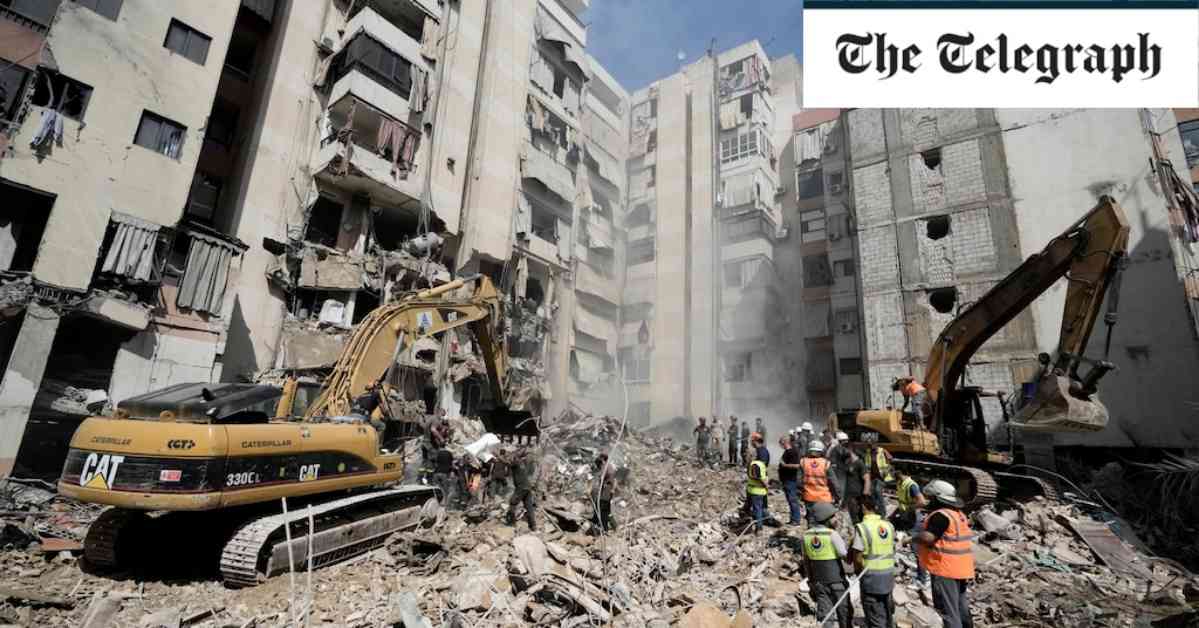Israeli Missile Strike Kills Second Hezbollah Leader in Beirut
Emergency workers are diligently using excavators to clear the debris and rubble left behind at the site of Friday’s Israeli missile strike in Beirut’s southern suburbs. The aftermath of the strike has left a devastating impact on the area, with the loss of lives and destruction of property.
Hezbollah, a prominent terror group, announced on Saturday that a second senior commander, Ahmed Mahmud Wahbi, was killed in the Israeli air strike in Beirut. Wahbi had been overseeing operations against Israel since the beginning of the Gaza war in October 2023 until the early months of this year. This tragic event marks the second major Hezbollah figure to be confirmed dead from the missile strike, following the killing of Ibrahim Akil, the group’s second-in-command.
The Israeli fighter jets targeted a multi-storey building in the southern part of the Lebanese capital, where Akil was holding a meeting with his senior lieutenants. The strike resulted in the deaths of 37 people, including at least 16 Hezbollah fighters, according to Lebanon’s health ministry. The casualties and destruction caused by the attack have left emergency responders working tirelessly to search for survivors and recover bodies from the rubble.
In response to the escalating tensions, the White House’s coordinator for the Middle East, Brett McGurk, expressed a lack of sympathy for Akil’s death. Akil had a $7 million bounty on his head for his involvement in the 1983 bombing of the US embassy in Beirut, which claimed the lives of 63 individuals. He was also implicated in the twin bombing attacks on the US Marine barracks in Lebanon that same year, resulting in the deaths of 241 US personnel and a total of 307 people.
US national security adviser Jake Sullivan acknowledged concerns about the mounting tensions between Israel and Lebanon but deemed the Israeli operation that led to Akil’s death as a “good outcome.” Sullivan emphasized the significance of holding individuals like Akil accountable for their actions, particularly for the families and individuals still affected by the tragic events of 1983.
The Israel Defense Forces (IDF) asserted that the strike had effectively “completely dismantled” Hezbollah’s military chain of command and vowed to continue targeting any terrorist organization that poses a threat to Israeli citizens. The IDF’s commitment to protecting its population was evident as they carried out additional strikes on Hezbollah targets across Lebanon, using artillery and fighter jet missiles.
The retaliation from Hezbollah was swift, with the terror group launching a barrage of rockets towards Israel in response to the Israeli strikes. Israeli towns and regions near the Lebanese border were targeted, resulting in nearly 100 missiles being fired at northern Israel within a short timeframe. While there were no reported injuries from the rocket attacks, the damage caused by the projectiles led to fires and destruction in affected areas.
The cross-border clashes between Israel and Hezbollah escalated throughout the day, with both sides engaging in military action. Israel continued to target Hezbollah positions in southern Lebanon, destroying rocket launcher barrels and other infrastructure used by the terror group for attacks. The ongoing hostilities between the two parties have raised concerns about the potential for a full-scale conflict in the region.
In Gaza, a separate tragedy unfolded as an Israeli air strike targeted a school that was serving as a shelter for displaced individuals. The attack resulted in the deaths of 21 people, according to the Hamas-run health ministry in Gaza. The IDF defended the strike, stating that it was a precise operation aimed at terrorists operating within a Hamas command-and-control center located near the school. Despite efforts to minimize civilian casualties, the strike led to significant loss of life, including children and women.
The situation in the region remains volatile, with multiple incidents of violence and retaliation occurring between Israel, Hezbollah, and other groups. The impact of the recent events has left communities in Lebanon, Israel, and Gaza reeling from the destruction and loss of life caused by the escalating conflict. The international community continues to monitor the situation closely, urging both sides to exercise restraint and seek peaceful resolutions to prevent further bloodshed and suffering.












